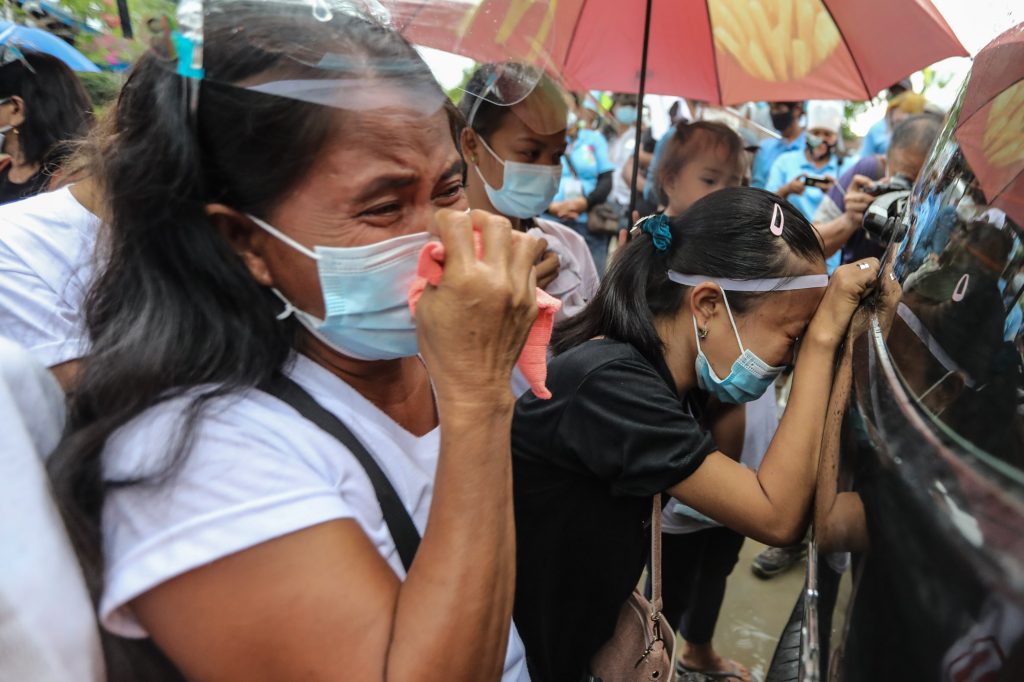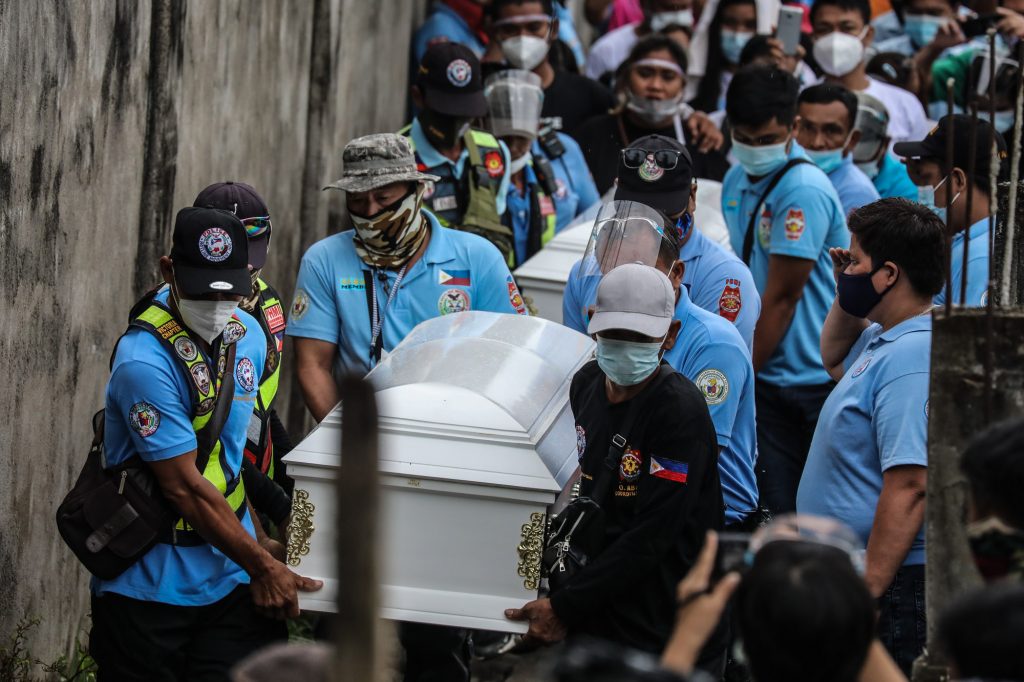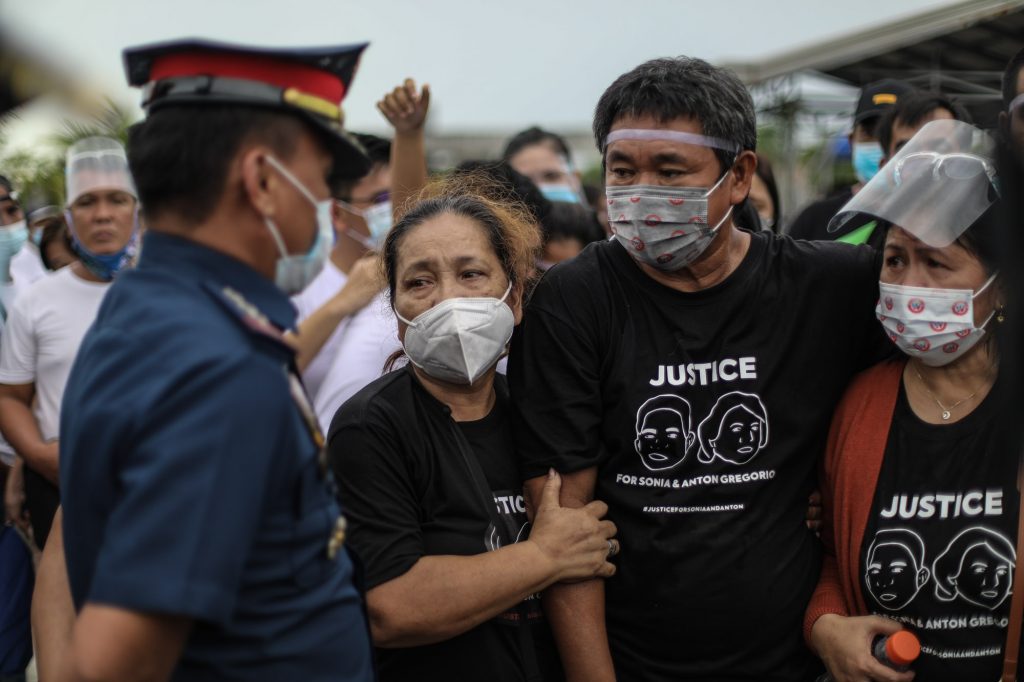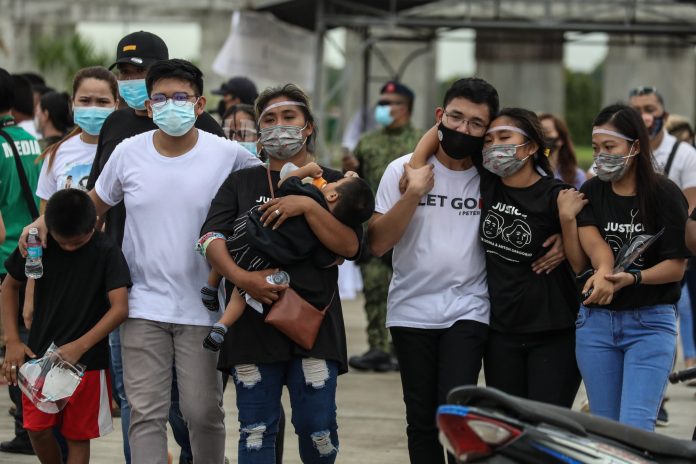The mother and her son who were killed by a police officer in the northern Philippine province of Tarlac were laid to rest amid cries of grief on Sunday, Dec. 27, two days after Christmas Day.
Hundreds of mourners demanding justice joined the funeral march for Sonia Gregorio, 55, and her son, Frank Anthony, 25, who were shot dead by Police Staff Sergeant Jonel Nuezca on Dec. 20.
The killing resulted in condemnations from various sectors, including Catholic Church leaders who dubbed the incident as proof of “ingrained impunity” in the country.
A video of the killing that made the rounds on social media showed Sonia hugging his son Frank, both unarmed, in an attempt to stop an altercation with the police officer.
“Mother, mother, I will never see you again,” Mica Gregorio, 14, cried during the funeral service. “Father, mother is alive …. They are alive …. Why? Why?” she turned to her father.
About a thousand people, wearing white and black shirts printed with messages calling for justice, attended the funeral service in the town of Paniqui in Tarlac province
“I lost a mother who was the most loving mother to us. I lost a brother who was also a very loving and caring brother. It’s very hard for us,” said Tasha Delos Santos.
“I hope our family gets justice.”
Philippine President Rodrigo Duterte has condemned the shooting and said he only defends police who do their duty, warning “there will be a hell to pay” for rogue officers.
In a video recorded on a family member’s mobile phone, Nuezca was seen engaging in a heated argument with the Gregorios over the use of a homemade cannon in Tarlac province, north of Manila.
The devices, which make a booming sound, are typically used to celebrate New Year.
When Sonia wrapped her arms around her son as the row intensified, Nuezca shot her in the head before doing the same to Frank. Before fleeing, Nuezca shot Sonia again.
The government has promised a thorough investigation.
“They weren’t criminals, they were the nicest family here,” said Gonyong Liwanag, a neighbor of the Gregorios.
Critics and rights groups said Duterte’s talk of killing criminals and promises to protect law enforcement have emboldened police to commit and cover up murder.
Government data show that 5,942 suspected drug dealers have been killed by police since 2016.
Rights group said that number is an understatement and accuse police of summarily executing users and pushers. Police say those killed had resisted arrest.

‘Condemnations’
Bishop Enrique Macaraeg of Tarlac condemned the killing, saying that “murder is wrong any way we look at it.”
“Killing is a sin against God and against humanity. Murder is not only a sin against the killed and their families. It is both a sin and a crime that cries out to heaven,” said the prelate.
He noted that “similar killings have been happening around us.”
“Some of them happened without a video to record them. Whether posted on social media or done hidden without a witness, killing is a sin. God sees all these killings,” said Bishop Macaraeg.
“There is no escape from God’s punishment. Killing is wrong. Murder is evil,” he added.
“Our faith assures us that this cry will reach the ears of God. There is no escaping from the justice of God, even if sometimes justice on earth is hard to find,” he said.
In a separate statement, Bishop Jose Colin Bagaforo said the “bloodshed in broad daylight … should not have happened in the first place had we let peaceful reconciliation, not hot-tempered emotion, prevail.”
“Hence, our strong condemnation of such abhorrent act, which should have no place in our society,” he added.
Earlier, Military Ordinariate Bishop Oscar Jaime Florencio called for a fair and objective investigation into the incident.

‘No to death penalty’
Church leaders also hit calls for the revival of capital punishment in the country following the killing of the Gregorios.
The religious leaders maintained that the revival of the death penalty “will not resolve the faults” in the country’s justice system.
Father Antonio Labiao, executive secretary of Caritas Philippines, said his office stands by the “old and true mandate of the Church” that “life is sacred and no one has the right to take it, even if that life belongs to a criminal.”
The priest said reviving the death penalty will not answer the “faulty justice system” and it “will not deter individuals from inflicting harm to others.”
“What we need is a more compassionate environment where our children can grow up loved, cared for, and accepted,” he said.
Father Labiao reminded those who are calling for the reimposition of the death penalty that “legally taking out one’s life is still murder.”
Several legislators have called for the revival of capital punishment following the killing of the mother and son.
The legislators said policemen who kill unarmed civilians “deserve the death penalty.”
Bills seeking the reinstitution of the death penalty are pending at the committee level of both Houses of Congress.
Bishop Gerardo Alminaza of San Carlos said the legislators calling for capital punishment are “barking on the wrong tree.”
He said that they must “check statistics” if capital punishment has significantly served as deterrent to crimes.
The bishop called on the government to “instead focus” its attention on improving the country’s justice system, “improve the standard of living, and provide quality education.”
He said the Church has provided arguments against the death penalty, such as “the possibility of judicial error.”
The bishop said capital punishment can also be used by “totalitarian and dictatorial regimes as a means of suppressing political dissidence.”

‘Culture of impunity’
Bishop Jose Elmer Mangalinao of Bayombong said the answer to the spate of extrajudicial killings and the culture of impunity in the country is not the revival of the death penalty but the “full and just implementation of laws.”
The prelate said there is a need for “continuous education, training, and formation of the police force,” adding that the government must “inculcate” in the minds and hearts of state security forces “the sacredness of life and human rights.”
On June 24, 2006, the Philippines abolished capital punishment.
Months before the passage of the law that ended the imposition of the death penalty, former president Gloria Arroyo issued a moratorium on carrying out capital punishment.
In April 2006, the Philippines commuted the sentences of some 1,230 death row inmates to life imprisonment — the largest ever commutation of death sentences, according to Amnesty International.
In his State of the Nation Address in July, President Rodrigo Duterte asked Congress to pass a bill that will reinstate the death penalty by lethal injection for drug-related crimes.
Pope Francis, in his later encyclical titled “Fratelli tutti,” said the “death penalty is inadmissible and the Church is firmly committed to calling for its abolition worldwide.”









